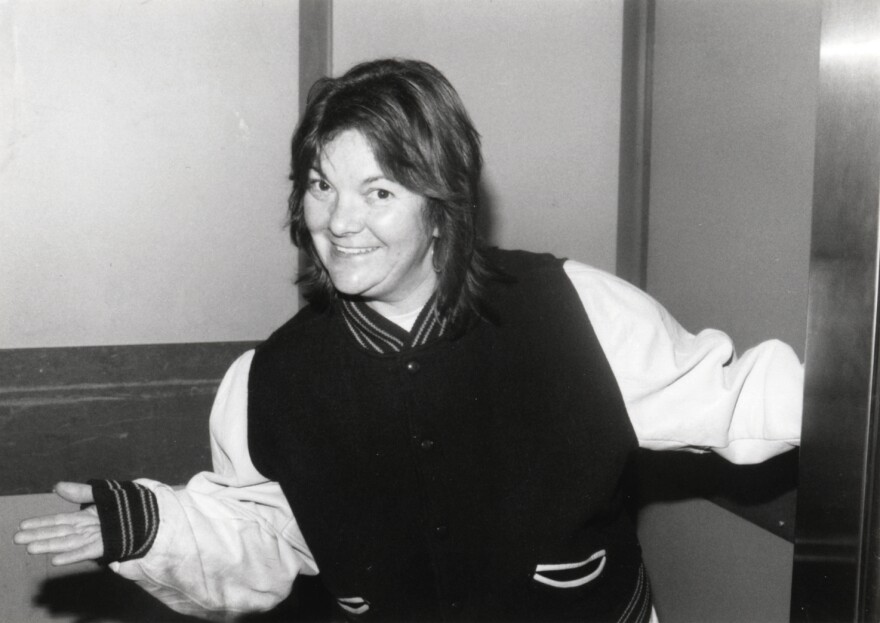Sharon Fennell, a.k.a. Sista Soul, has heard it all. And through it all she has created a family where rhythm and lasting connection to her listeners run deep… especially in the still of the night.
Sista Soul’s last installment of “Sista’s Place” was Sunday December 18.
---
UPDATE Monday, Dec 19: Missed Sista's final show? Hear friends and family celebrate her during her final program here.
---
It was 1980 when Humboldt State student Sharon Fennell found KHSU-FM, the public radio station located on campus.
At the time, producers of “Alternative Review,” a radio show that offered news, interviews and analysis from a progressive perspective, wanted a woman's voice. So, they turned to Fennell. An activist, organizing local house meetings for a group called Central American Solidarity, Fennell “loved it, loved it, loved it.” With microphone in hand, she covered picket lines and strikes,and interviewed Noam Chomsky and guests Nicaragua, El Salvador and South Africa. Produced by Tom Cairns, Sharon Fennell and husband Michael Fennell, Alternative Review aired for 15 years.

But the love of her heart and soul was soul music. "I had so much music inside me that was so good" she said, "and I played it all.”
Growing up in the Bronx, Fennell had always been called a soul sister. In 1981, Fennell officially became Sista Soul when she hosted her first music show, “Old Soul Show.”
The Friday night program marked the beginning of her next chapter at KHSU--a journey rich with rare R&B to sultry soul, Latin soul, jazz and gospel. Sista's Place had the music. The show also would become about much more than the music.
In 1989, the Pelican Bay State Prison opened in Crescent City. Sista prayed to her goddess that the KHSU signal could be heard up north, so her show, and the music she so very much loved, could be shared. “I knew that the music I loved would be the same music that those men at Pelican Bay would love." She was right.

One fan was Troy Williams. With a piece of wire fashioned into an antenna, Troy and his cellmate tuned into some Marvin Gaye, then Smokey Robinson, then Gladys Knight.
“I hear your program and a feeling of nostalgia overcomes me. It sure sounds good and definitely helps to ease the pain" Williams wrote in a letter to Sista Soul. His cell mate told him he was wasting a stamp, that Sista would look at the return address and never write back and probably wouldn't even read it. How wrong he was. Sista read the letter and many more to come.
At the time she had no idea how a letter would transform lives.
But not all of the Pelican Bay residents had access to radios. The reception inside the walls wasn't the best even with the new signal but more and more men began listening. They also began writing her letters, requesting songs for their loved ones and thanking her for the joyful, nostalgic "mushy-gushy" love songs she played. Soon the prison put KHSU on their cable network. If someone had a television or radio unit they could get access.
That changed in 2001. The warden of the supermax prison wrote to the management of KHSU about safety and security issues regarding the institution and the public. According to warden, via the letters sent to Sista Soul's radio show, messages allowed inmates to communicate with each other and the community.
Authorities saw dedications and shout-outs to their families and associates through written as criminal activities inside the prison. The warden explained that although Sista's Place might see the letters as an innocent activity, they viewed them as coded messages and cut access to the cable network.
Sista's Place, with the support of KHSU’s staff and management, made a compromise with the prison: She would alter names and not use last names over the airwaves and authorities restored radio access.
Sista, guided by her sensibilities and consciousness as an activist, began addressing prison conditions at Pelican Bay such as solitary confinement and other topics. The prison authorities, however, thought she was innocently being used. They removed the KHSU signal off of their in-house cable network once again, citing security and safety reasons. That was back in 2009. At this time, it's still not total open access on the prison network channel but if a prisoner has a radio or radio/TV combo they can still hear KHSU.
On December 18th, Sista's last show, Williams will read some heartfelt letters over the air. Troy has become the son Fennell never had. "I never expected that what happened, happened," says Troy. “Sometimes I am in disbelief,” he tells her, that all of this has happened. “That I'm here, that my life is good.”
And that's what Fennell tells Troy as well. Their friendship wasn't planned. It happened because of Sista Soul. She understands that Sista Soul has deeply affected the lives of the men of Pelican Bay, and it blows her away.
"We all come into this life wanting to do something good" she says, "…and we get handed the deck we get handed and life happens. I never expected that what happened to me would indeed happen … my eyes opened to what we do in this country to our prisoners. To the least of the least. I have played my part of opening hearts and minds. I'm just very grateful.”
Sista Soul found her frequency. In her 36 years of volunteering and working with KHSU, Fennell has been the Public Affairs Executive Director (1986-1994), Underwriter/Sales/Fundraiser (1983-1989), Fine Arts Coordinator (1983-1994). She also supervised local in-house productions of 12-week programs including "Labor USA", "Men's Alternative to Violence," and "For the Birds.”

After 36 years of volunteering at one place, she's learned that the joyous sounds of Soul, R&B, and Doo Wop opens hearts, giving her the capacity for unlimited love. "My greatest joy has been keeping this music alive" she says.
So what's next? What happens after the last Sista's Place show?
"I hope I've opened up something for someone to step in" Sista says, "Time to move over for someone else. Time to diversify. Now it's up to someone else and the station to maintain a PLACE".
When the radio plays the last song, the souls that Sista has touched will thank her with their own unconditional love. The kind that generates change. For one song, as one letter, can change lives.
Sista Soul hopes to still do love shout-outs, and might be on the radio from time to time to talk about issues she cares about. You can hear Sista's Place, the last show Live on Sunday, December 18, 2016 from 2-5pm on KHSU 90.5 all our other signals at live streaming at KHSU.org




